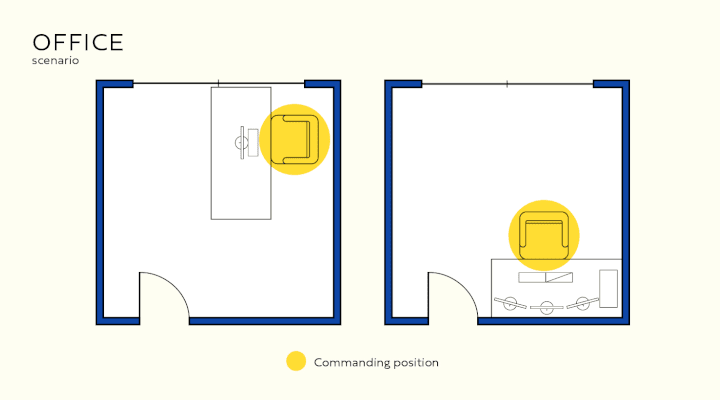Improve Your Energy At Work With Practical Feng Shui

What if simply moving your furniture around or switching seats could dramatically boost your creativity and productivity? Some believe that by following the basics of feng shui in arranging your space, you can better support your goals by creating more positive energy and flow.
"Feng shui" means wind and water. In Chinese culture, a gentle wind and smooth water bring health and good harvest. By optimising the flow of energy within a space, feng shui can help to create an environment that fosters well-being, productivity and success.
While some may associate feng shui with birth dates and compass directions, the most basic form of feng shui is based on the physical world: landscape, orientation, the environment, and the flow of energy (or “chi”, which means air).
It’s about applying common sense and instinct, says Cliff Tan, an architect who shares feng shui principles on TikTok, Instagram and YouTube (@dearmodern). His cheerful and accessible videos about how to organise rooms and spaces have introduced the concepts of feng shui to audiences worldwide.
Here are some feng shui fundamentals and practical tips you can consider if you are looking to transform your home or office workspace into one of positive energy and productivity.
The Command Position
In feng shui, the concept of the command position is about the best position to sit in a room or at a table.

Whether you’re working at the office, from home, or in a third place such as a café or library, where your desk is relative to the rest of the space matters.
- If you need to focus on deep work, find the calmest spot in the area. This is likely to be corners with low foot traffic, or out of paths where most people will walk.
- If your work is about connecting with the public and building rapport, consider choosing spots with higher energy, where people are more likely to ‘bump’ into each other and be open to chats.
Where possible, arrange your desk or workspace so that it gives you a clear view of the entrance. Your desk should be facing the door, but not directly in line with it. This will give you a sense of power and control over your workspace, while protecting you from bursts of energy coming through the door, augmenting your focus and productivity.

In meeting rooms, the end of an elongated table is more likely to draw attention and offer a good view of the room, which is why the most respected or senior person is often placed here. Round tables offer a cosier feel and sense of equal hierarchy – great for 1-on-1 sessions that feel less intimidating.
As “chi” or energy flows through doors, avoid being seated too close to entrances or having your back to the door to prevent distractions and a sense of uncertainty. Additionally, ensure that your back enjoys the support of a high-backed chair or a sturdy wall behind you, as these provide stability and comfort.
Intentional Arrangement
The position of furniture and items in your workspace can significantly influence energy flow. Arrange furniture and work items for easy access and movement.
Avoid having furniture with sharp angles or corners facing you, as they can create a sense of unease. Instead, choose rounded or curved shapes to promote a gentle circulation of energy throughout the space. If you have to sit near a sharp corner, try placing a plant or other object in front of it to soften it.
A Note on Clutter
While feng shui is silent on clutter specifically, having clutter can cause stress and anxiety. Make sure to keep your desk clear of unnecessary items and paperwork, or any item that obstructs the flow of energy within your space. Regularly set aside time to organise your workspace for a clearer mind and better concentration.
Colours for Success
The colours you use in your workspace can have a big impact on your mood, energy levels and productivity. Choose hues that align with your work goals or the energies you wish to have in your workspace.
For instance, serene blues and greens instil a sense of calm and concentration, while vibrant oranges and yellows can stimulate creativity and enthusiasm.
Integrate these colours into your décor through paint, furniture or accessories – making sure to create a balance of light and dark. Tip: Use up to three tones of similar colours for an invigorating ambience.

Natural Elements
Natural light not only elevates mood but also boosts mental clarity and concentration. Position your workspace near a window to allow the influx of natural light.
If windows or natural light is not available, opt for bright and even lighting. Mimicking the radiance of natural sunlight will have a similar positive impact on your well-being.
Plants are a great way to bring positive energy into your workspace. They help to purify the air and improve your mood. Opt for indoor plants that require minimal maintenance, such as succulents, peace lilies or snake plants.
Natural materials like wood or bamboo in your furnishings or accessories will also create a sense of connection with the earth.
A Change in Fortunes?
While applying the principles of feng shui can provide the right environment to optimise performance for achieving goals, it cannot guarantee success or any specific outcome. “Human luck” – our own hard work and effort –probably plays a larger part in shaping our lives and futures.
But the environment we work in shapes our moods and feelings. When we feel better in a space, it can make an impact, whether in greater health and wealth in life or creativity and productivity at work.

For more stories like this, subscribe to the Challenge newsletter or follow the Challenge Telegram channel.
- POSTED ON
Oct 3, 2023
- TEXT BY
Siti Maziah Masramli
- ILLUSTRATION BY
Ryan Ong









